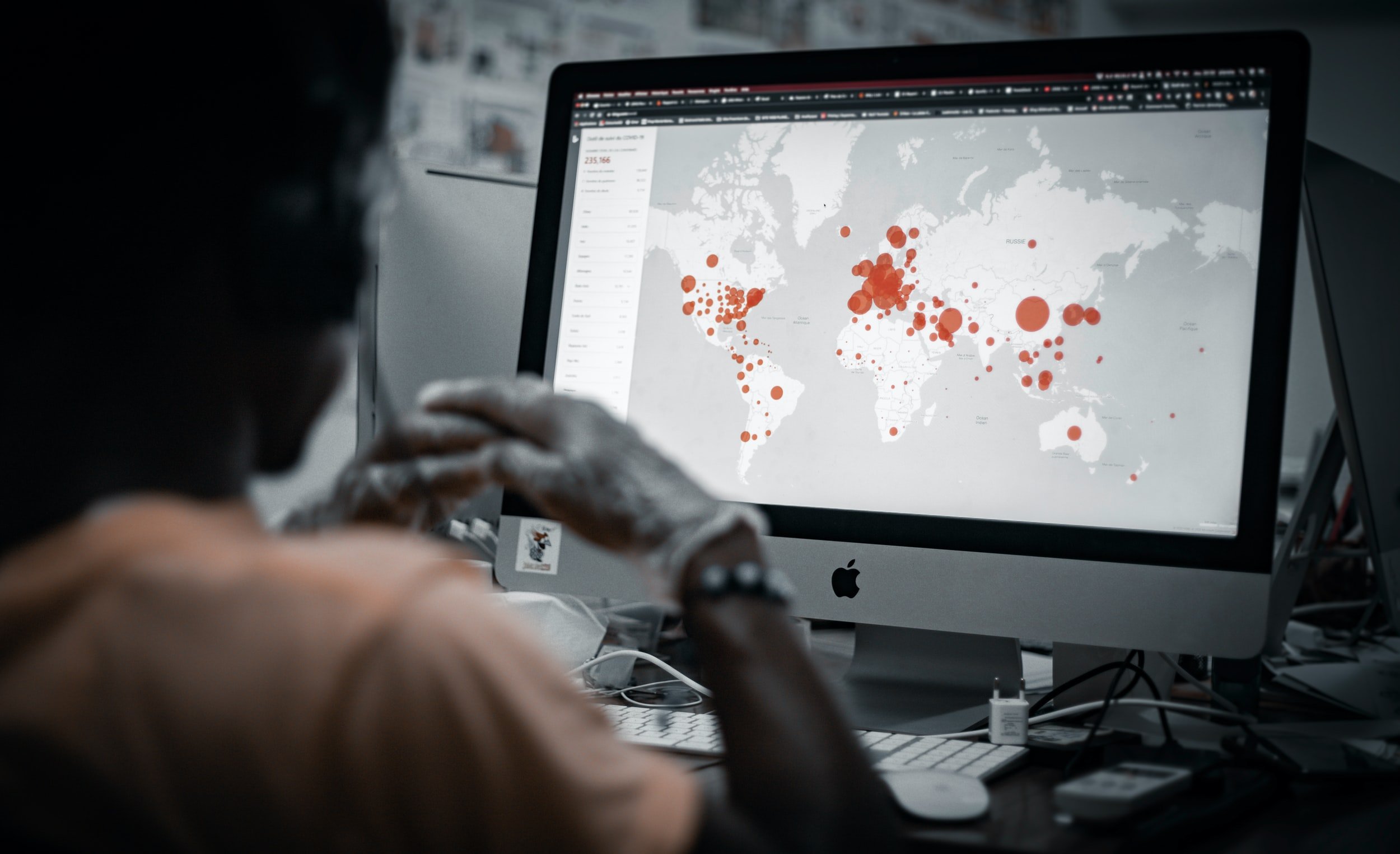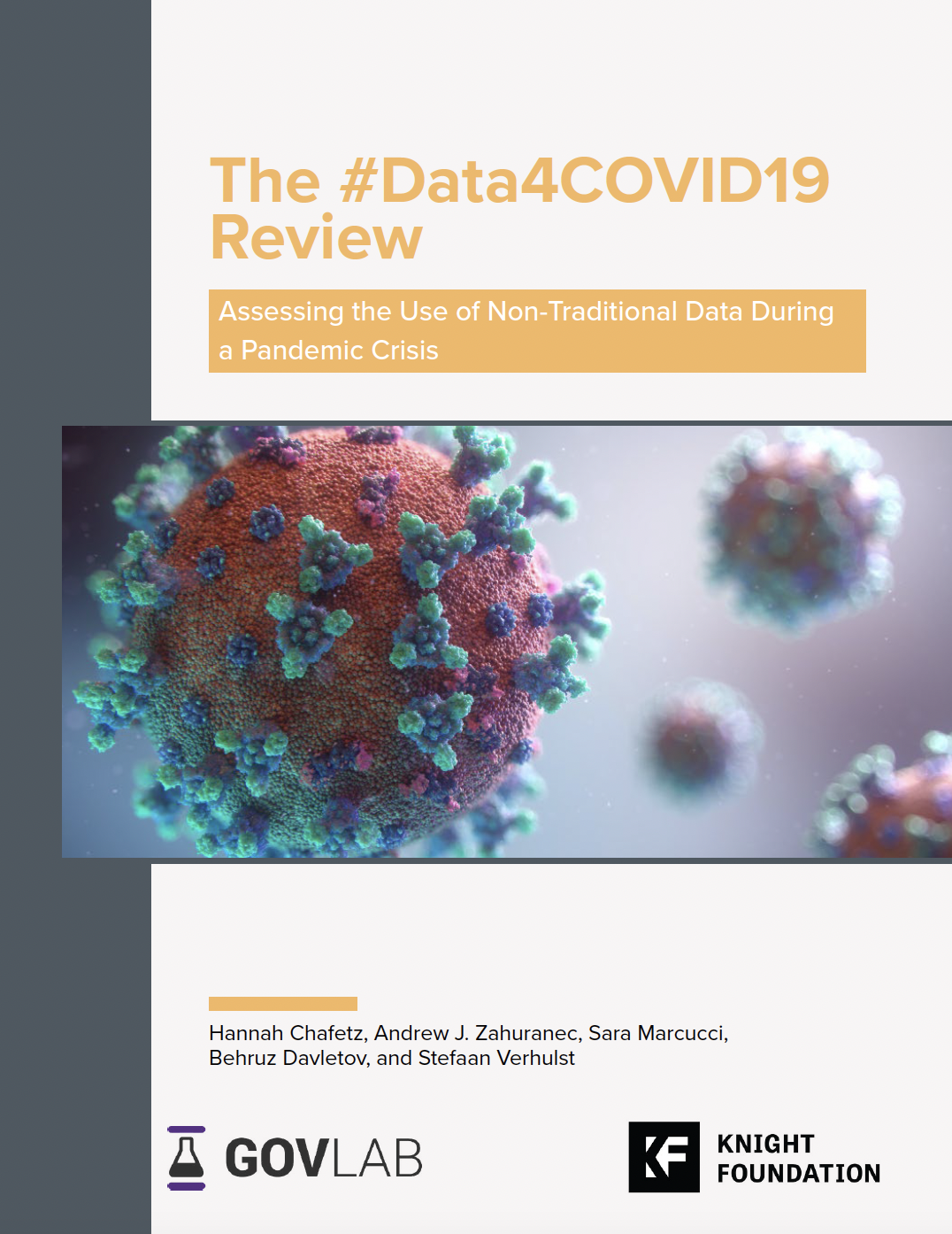
The #Data4Covid19 Review
Reviewing Data-Driven Responses to the Pandemic: Lessons from the Use of Non-Traditional Data
The GovLab, with the support of the Knight Foundation, sought to evaluate how non-traditional data was used to respond to the COVID-19 pandemic. We aim to identify lessons and recommendations that can be applied to future data-driven crisis management. Learn more by reading the full report.
COVID-19 has had a catastrophic impact on the world–inflicting enormous health, economic, political, and cultural challenges.
Decision makers around the world have undertaken varied approaches to minimize the spread of the virus and consequences of the pandemic. Many of these efforts were driven by data, including data from non-traditional sources–i.e. data that is “digitally captured (e.g. mobile phone records and financial data), mediated (e.g. social media and online data) or observed (e.g. satellite imagery),” using new instrumentation mechanisms (e.g. mobile applications and websites). COVID-19 is claimed to have been a “watershed moment” in accessing and re-using non-traditional data. However, there has been little research into how non-traditional data initiatives were designed or what impacts they had on COVID-19 responses.
Our goal was to provide greater clarity on the value of non-traditional data sources for COVID-19 response efforts around the world.
This #Data4COVID19 Review aimed to fill this gap by conducting an in-depth study about how different non-traditional data sources have been used during COVID-19. Among the questions we sought to answer: Why was non-traditional data used? What types and sources of non-traditional data stood out? Who was calling for non-traditional data? When and where did non-traditional data initiatives take place? How was non-traditional data accessed and used? By answering these questions, The GovLab identified important lessons from the pandemic that can prepare us for future crises.
To evaluate what worked, we developed four briefings that compare how non-traditional health, mobility, economic, and sentiment data were used during COVID-19.
The GovLab developed four briefings; short-form, easily digestible analyses intended for decision-makers and their staff on what is involved in using different data types for crisis response and the considerations they should be cognizant of should they pursue that data themselves in the future.
In the latter part of the report, we provide recommendations towards advancing the responsible use of non-traditional data during future dynamic crises.
We conclude by suggesting a set of recommendations for decision makers looking to improve their capacity to use non-traditional data responsibly for crisis management and an assessment framework that could be applied when designing crisis non-traditional data initiatives. The recommendations include:
Increasing evidence and awareness about the value proposition of non-traditional data: There is a need for a stronger evidence base that can generate awareness of current practices and support the value proposition of non-traditional data during crisis situations. Creating a more data-driven approach to using non-traditional data can broaden non-traditional data initiatives and ensure they can grow beyond pilot programs and proofs of concept during future crises.
Advancing trust, ethics, and equity within non-traditional data initiatives: There is a need for public and private organizations to establish trust among parties and with society on how non-traditional data is being used. Prioritizing trust, ethics, and equity at the start of and throughout non-traditional data initiatives can increase the legitimacy of its use and more meaningfully resolve crisis-driven challenges based on a combination of non-traditional data and lived experience.
Strengthening collaboration and institutionalization of non-traditional data uses: There is a need for multi-stakeholder partnerships to increase the data capacity and speed of implementation of non-traditional data initiatives in a systematic way. Institutionalizing internal professional functions and external partnerships through data stewards can accelerate the use of non-traditional data during crises.
Preventing fragmentation, and improving readiness and coordination: There is a need for a more coordinated approach–across all crisis management efforts and functions–to address needs both as health systems evolve and as institutions face future public health emergencies. Minimizing fragmentation has the potential to increase readiness for future dynamic crises.
The research was conducted with the input and support of a distinguished advisory group, interviewees, and expert peer reviewers. By learning from our response to COVID-19, we can better understand how non-traditional data can be used to respond to future dynamic crises.
We invite you to learn more by reading the full report.
New Primers from the Data4COVID19 Review
The GovLab team has developed two short summaries of the #Data4COVID19 Review report. The first document explains what we mean by non-traditional data. It summarizes the main types and sources of non-traditional data used during COVID-19 and key use cases from around the world. The second document discusses key takeaways from those non-traditional data use cases and actions to accelerate the responsible use of non-traditional data during crisis situations. Click the buttons below to download the documents.
Sign up to the Data Stewards Newsletter and be the first to know about the progress of the The #Data4COVID Review.
Follow our research and learn about lessons learned from the pandemic in our newsletter.
The GovLab Team
Stefaan Verhulst
Co-Founder and Director, Data Program
Sara Marcucci
Research Fellow, The GovLab
Andrew Zahuranec
Research Fellow, The GovLab
Hannah Chafetz
Research Fellow, The GovLab
Advisory Group
Dr. Ana Beduschi
Dr Ana Beduschi is an Associate Professor of Law at the University of Exeter and a Senior Research Fellow at the Geneva Academy of International Humanitarian Law and Human Rights.
Dr. Caroline Buckee
Professor of Epidemiology, and the Associate Director of the Center for Communicable Disease Dynamics at the Harvard T.H. Chan School of Public Health
Dr. Ciro Cattuto
Principal Scientist at ISI Foundation, Associate Professor in the Computer Science Department of the University of Torino
Dr. Chinwe Lucia Ochu
Director, Prevention Programmes & Knowledge Management and Head of Research at Nigeria Centre for Disease Control
Dr. Leo Ferres
Associate Research Professor, Data Science Institute, Facultad de Ingeniería, Universidad del Desarrollo
Sir Geoff Mulgan
Professor of Collective Intelligence, Public Policy and Social Innovation at University College London
Dr. Nuria Oliver
Scientific Director and Co-Founder of ELLIS Alicante Foundation, Chief Data Scientist at the Data-Pop Alliance, Chief Scientific Advisor at the Vodafone Institute, Board Member at ELLIS, Fellow at the Spanish Royal Academy of Engineering, Member of the Industrial Advisory Board at King's College



















